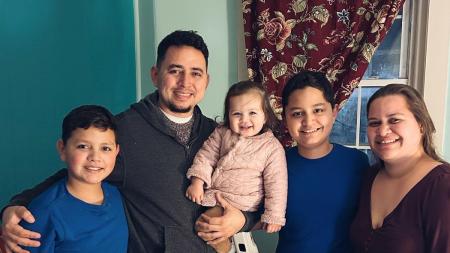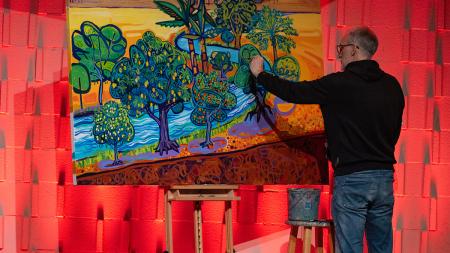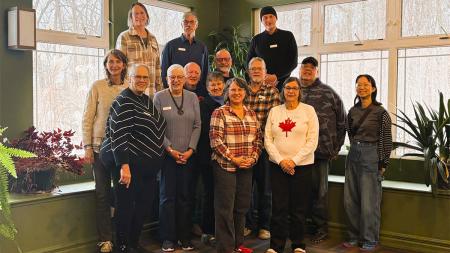Finding Church in Food Pantries and Thrift Stores

On any given Saturday, roughly 140 people stop by Emmanuel Christian Reformed Church in Sauk Village, Ill., to pick up food, soap, shampoo, and other necessities. At Emmanuel, being the hands and feet of Jesus means much more than Sunday services. For 70 years the church’s sanctuaries have included food pantries, public schools, and thrift stores.
“We have missions in our DNA—it’s as natural to our church as breathing,” said Pastor Jeff Hale.
Planted by First Christian Reformed Church (now New Hope) in Lansing, Ill., with substantial support from nearby Munster (Ind.) CRC, Emmanuel began as a community in the neighborhood of Sauk Village in 1968. The church’s neighbors were some of its first members. Over the years, the church provided kindergarten and nursery school services before they became standard in public education, and for a time, Emmanuel’s vacation Bible school and other children’s ministries reached hundreds of children.
Today the congregation is still working hard to reach their neighbors. In addition to organizing a food pantry, they also run a thrift store, an addiction-recovery ministry called Hope and Healing, and a GEMS program for girls that meets in a local public school.
Emmanuel CRC itself is not a large congregation—the church averages 25-40 people in worship every Sunday. And while the congregation gives generously, their budget isn’t particularly large either. Instead they fund their ministries creatively. The thrift store’s profits, for instance, help to fund the food pantry, and the church also receives donations from several other organizations to make the Food Pantry self-sufficient.
“Emmanuel CRC is a testimony of how every church has a purpose in their community . . . and the size of the church does not matter. What matters is how the Holy Spirit leads you and if you will follow,” said Brad Meinders, Resonate’s regional mission leader for the Central USA region.
While the church has been missional from its start, the Emmanuel community continually works to discern where and how God is working, and how they can join in. A few things that have helped in this discernment, say leaders, are partnering with missionaries overseas, welcoming returning missionaries (such as Pastor Hale) as part of their congregation, receiving support from Resonate regional teams, and working through Resonate’s Go Local process.
“One thing that steers or drives a lot of our mission work is the Go Local committee,” said Paul Vanderaa, who serves as council clerk and is involved in the food pantry. “We went through the Go Local courses from Resonate, and we learned the practice of ‘Dwelling in the Word’ and how to do experiments to find ways to minister better – and that’s been a great help to the church.”
The congregation has continued to pivot and expand over the years, including partnering with ministries overseas. One particularly formative experience involved supporting Resonate missionaries Joel and Jeannie Huyser while they served with the Nehemiah Center in Nicaragua. Emmanuel communicated often with the Huysers and, for five years, sent groups to serve and learn alongside the local community where the couple served.
Emmanuel CRC’s international partnership made them more passionate about mission in their own neighborhood, and it helped them understand the importance of relationships and patience. For example, it can take a long time for a church to see the transformation that they pray for.
“There is a patience in our midst to give time to work . . . people want to see the results now. We have to rely on the fact that it’s in God’s time—and sometimes, that can seem really, really slow to us,” said Nita VenHuizen, a long-time member of Emmanuel and chair of the church’s missions committee.
“We have to allow for this transformation to take place in other people,” added Sherry Vanderaa, who works with the church’s Hope and Healing ministry. “That can only be nurtured through friendship and being involved in each other’s lives. Sometimes we have such high expectations for people to behave in a certain way, to talk a certain way. But to make a difference in people’s lives, it takes time—and it takes time with them.”
Sherry added that God has worked in her own heart to focus on friendships. She became especially close to one woman who was part of the Hope and Healing ministry – and one day, when Sherry addressed the woman as her friend, she said, that changed everything.
“You’re the first person in my life who has ever been my friend,” the woman told Sherry.
The woman’s daughter even started to volunteer for Emmanuel’s thrift store. She wasn’t interested in attending the church’s worship services, but she knew that her mother loved the thrift store. And when her mother passed away, she asked Emmanuel to help with the funeral—even requesting that they hold it in the thrift store.
“That’s where church is,” she said.
While a few people have joined Emmanuel’s faith community through the church’s outreach ministries, attendance at worship services hasn’t grown numerically. But that’s okay with them—the church has come to see mission not as a way to get people into the pews but to form relationships with people.
“Church can happen in more than one place,” said Hale. “I mean, it happens in that food pantry and thrift store. We’re not having a church service, but they’re meeting God there. . . . God is able to touch people where they need him – and when and how.”


